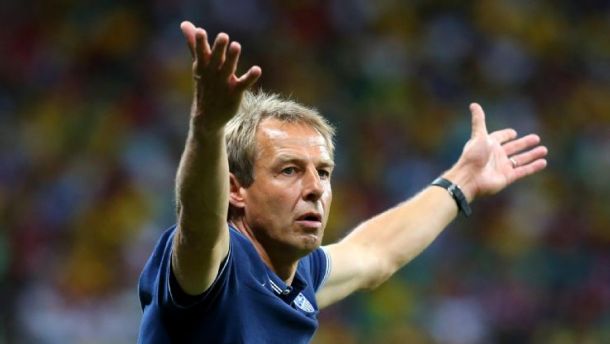Following the loss to Jamaica in the 2015 CONCACAF Gold Cup and the realization that the USMNT will not play in the final, fans have been questioning how much longer coach Jurgen Klinsmann will be in charge. Some have even been requesting and urging that the German be fired. While the poor performance in the tournament, questionable decisions, and early exit were unexpected and less than desirable, is one bad tournament enough to remove a coach that is still setting records?
First, fans need to remember why Klinsmann was brought in and what has been asked of him. Klinsmann was renowned for his turnaround of the German National Team off the pitch through his emphasis on player development. Klinsmann was brought in not just to coach, but to develop the next generation of US Soccer and develop a youth system to sustain the growth of soccer domestically.
Secondly, it should be noted that Jurgen Klinsmann is arguably one of the best teachers of the game at this level. His expertise as a player and his ability to relate what needs to be done to players exceeds that of most coaches. Players under Klinsmann have thrived when they are able to execute what he is asking of them. His development of young talents was extremely important to the rise of German soccer that culminated in a win in Brazil for the 2014 World Cup.
Finally, the goal of US Soccer is to win a World Cup. Klinsmann’s system has proven capable of such a feat. While the US doesn’t have the same player pool that Germany does and winning the World Cup is a stretch, a final four finish would be considered a huge victory and is not outside the realm of possibilities.
Now that the reasoning for Klinsmann’s appointment have been explained, those goals should be applied to any analysis resulting in his dismissal. Everything that has been done and every decision that has been made can be traced to a desire to build for the future and brining in young talent.
Many arguments for firing Klinsmann hinge on personnel issues and the absence of certain players at key times. These are not always easy decisions and often times, good players will be left out for less than popular reasons. There is one player that must be discussed here. Landon Donovan’s absence in Brazil was shocking to most and consider criminal by more than a few and worthy of the sacking of Klinsmann then. This decision remains so unpopular that some fans still view the top 16 finish a disappointment despite surviving the group of death and taking Belgium into extra time before being eliminated.
The events that surround Donovan and Klinsmann, the decision to leave him off the squad for Brazil, and what could have happened could be turned into its own novel with movie rights, so this article will pick the major highlight that should not be overlooked. Landon Donovan is, by stats and play, the best American to ever take the field. He could do it all and did on multiple occasions. But do not overlook what made that possible.
Bob Bradley fielded a flat 4-4-2 lineup more often than not. Donovan was a central figure in those lineups and able to roam the field as he saw fit. The team was structured to play around him and the formation was fluid to allow him to do his thing. Even his club, the LA Galaxy, fielded a similar style of roster. This style of play was not what Klinsmann built his team around was not the style he wanted to play. When Donovan was successful under Klinsmann, it was not because he was being well utilized by the system, it was because he wasn’t playing within the system.
When analyzing the statements of Klinsmann throughout his tenure with US Soccer, we have seen on trend: the team is more important than the individual. No player is above the system or irreplaceable. Landon Donovan was not an effective part of the system and therefore not fit to stay with the system. Like it or not, agree with it or not, Klinsmann’s favored 4-2-3-1 and his replacement 4-4-2 diamond formation did not allow for Donovan to play to his strengths and left him on the outside looking in.
For the 2015 CONCACAF Gold Cup, two names come to mind that could have been included but weren’t. Matt Besler and Benny Feilhaber, both of Sporting Kansas City, were left off the squad. Besler was an anchor, along with Omar Gonzalez, of the defense that carried the USMNT through the Hex and into the round of 16 in Brazil. The able veteran is arguably one of the best two defenders in the current player pool.
Feilhaber, on the other hand, has been on the outside looking in ever since Klinsmann took over. Despite having a career year and being in the best form of any American midfielder when the roster was selected, he was left off in favor of younger players. Whether or not these two would have changed the outcome against Jamaica, the fact remains, they were left off for younger players in an effort to get them more experience. Ventura Alvarado and John Anthony Brooks both got valuable playing time and experience in place of Besler while Alejandro Bedoya, Gyasi Zardes, Joe Corona, and Mix Diskerud kept their spots instead of Benny. Klinsmann met one of his goals in developing young players and building towards the next World Cup.
Besides just personnel issues in major tournaments, Klinsmann has been criticized for constantly tinkering with his formations and rosters and never sticking with a set group. This can be infuriating to fans as they see an extremely successful lineup one game and a struggling one the next with several new faces. This can be problematic for any coach and easily create issues during a tournament, but tactical changes based on opponents’ strengths and potential matchups is common practice.
The ever changing rosters is also indicative of a team searching for players. New faces are always being tried out and players are given second chances to show they are ready. How many fans would have honestly known who Jordan Morris was if he hadn’t been included? Who would be watching Bobby Wood’s career with intent and hope as they wait and see if he will be the next great striker? These roster changes are a necessary evil for a team that is still building for the future.
Jurgen Klinsmann’s defenses have been shaky since his arrival and adequate starters were not easy to come by. Bob Bradley did no favors for Klinsmann when he continually used Carlos Bocanegra, Oguchi Onyewu, Damarcus Beasley, and Steve Cherundolo well into their careers. Klinsmann had a core of defenders on the verge of retirement, three of the four didn't play in Brazil, and no prospects waiting. The fact that he found and built the defense he had in the time given is a miracle in and of itself.
The success of Gonzalez and Besler coupled with the longevity of the previous defense makes it easy to expect the same, but those that forget history are doomed to repeat it. If the United States wants to be a perennial contender, they will need a steady of elite defenders and that isn’t achieved by constantly playing the same group. At this time, the team has five or six able players from seasoned vets down to young hopefuls that are playing at roughly the same level. The loss of the best will not be instantly felt or seen as the next man up is ready and accustomed to the team.
Besides who has been called up, the attacks on Klinsmann have come as fans try to second guess the lineups that have been put out. So-and-so would do much better than so-and-so. How does anyone know for sure? Just last summer, many fans thought Brooks was the best overall defender on the roster, but not playing. Now he's an outcast. Lineups are as much about chemistry and opponent as they are about raw skill. In competitive play, this writer has yet to see a Klinsmann squad look less than competitive for the full 90 minutes. They have always managed to claw their way through games, and even the poor results have come with a team fighting til the bitter end.
The failure to get an adequate result in the Gold Cup being a reason for firing the coach seems more absurd when his other accomplishments on the field are considered. Jurgen Klinsmann led the United States to their longest ever winning streak and soared through the Hex. After picking up the first American win in Italy and Germany, he went on to record their first win against the Netherlands.
To top off the winning accolades, Klinsmann’s squad got their first ever win on Mexican soil and did it in the Estadio Azteca, one of the toughest stadiums in the world to play in. The United States went from perennial hopefuls to believers in a few short years. After an intense high and the belief that every game is winnable, an early exit against a weaker team appears so much worse and is easy to blow out of proportion. In four years with the team, Klinsmann has done what no other coach has done.
To sum it all up, the poor performance in the 2015 Gold Cup is not enough to justify firing the most successful coach in modern times. Jurgen Klinsmann has transformed the team from a group of players relying on one or two standouts to a group of guys winning and losing as a team. Fans know who the youth and the next generation are well ahead of players from years past.
The gap between the roster and those on the outskirts is diminishing quickly and the starters are not all locks either. If a World Cup is truly the goal, Jurgen Klinsmann has not lost this writer's trust. There will be bumps along the way, but the goal is clear and the decisions appear to be moving the entire team forward towards that goal. A hiccup now is worth it if 2018 ends with the USMNT playing in the World Cup Final. And if the team doesn't make it, the risk is still worth the reward and the future of the team is with the up and coming young players, not the aging veterans.






































